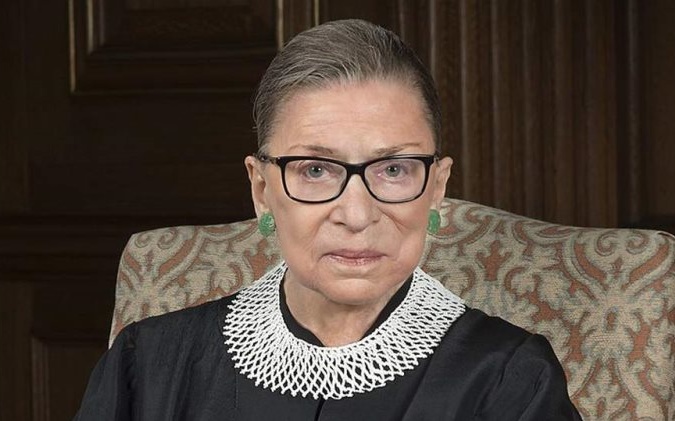UPDATE, 1700 GMT:
Earlier this week, Ruth Bader Ginsburg dictated a statement to her granddaughter Clara Spera, “My most fervent wish is that I will not be replaced until a new president is installed.”
Barack Obama has led the call for any replacement of Supreme Court Justice Ruth Bader Ginsburg (pictured), who died on Friday, to come after the November 3 election.
The 44th President paid tribute to the 87-year-old justice, on the Court since 1993: “Ruth Bader Ginsburg fought to the end, through her cancer, with unwavering faith in our democracy and its ideals.”
He then recalled that Senate Republicans — led by Majority Leader Mitch McConnell — blocked his replacement of the late Justice Antonin Scalia for almost a year in 2016, after Obama nominated Judge Merrick Garland as his replacement:
Four and a half years ago, when Republicans refused to hold a hearing or an up-or-down vote on Merrick Garland, they invented the principle that the Senate shouldn’t fill an open seat on the Supreme Court before a new president was sworn in.
A basic principle of the law — and of everyday fairness — is that we apply rules with consistency, and not based on what’s convenient or advantageous in the moment.
Obama added, “The questions before the Court now and in the coming years — with decisions that will determine whether or not our economy is fair, our society is just, women are treated equally, our planet survives, and our democracy endures — are too consequential to future generations for courts to be filled through anything less than an unimpeachable process.”
Hillary Clinton, the Democratic Presidential nominee in 2016, said in a TV interview, “What Ruth Bader Ginsburg did was to make it abundantly clear that the Constitution had to explicitly, wherever possible, be interpreted as providing for the equal rights of men and women.”
She cautioned that Congressional Democrats “will have to use every single possible maneuver” to prevent McConnell from enacting “the greatest travesty” and “monumental hypocrisy” in attempting to fill Ginsburg’s seat.
Democratic Vice Presidential nominee Kamala Harris wrote in a statement:
Tonight we mourn, we honor, and we pray for Justice Ruth Bader Ginsburg and her family. But we also recommit to fight for her legacy.
Doug and I send our heartfelt prayers to Jane and James, and the entire Ginsburg family, particularly on this holy day of Rosh Hashanah. pic.twitter.com/SNyqZCznfv
— Kamala Harris (@KamalaHarris) September 19, 2020
McConnell: We Will Rush Through Confirmation
After McConnell and Senate Republicans denied a confirmation process for Judge Garland in 2016, Donald Trump’s victory opened the way for the appointment of conservative Justice Neil Gorsuch. Another conservative, Brett Kavanaugh, succeeded the retiring Anthony Kennedy, in 2018.
The changes gave the conservatives a nominal 5-4 majority on the Court, but Chief Justice John Roberts and occasional Gorsuch have joined moderates to check Trump’s efforts to restrict immigration and conservative initiatives to limit abortion.
A simple majority in the Senate is needed to confirm a Justice.
Told by reporters of Ginsburg’s death as he returned from Minnesota, Trump said, “She led an amazing life….She was an amazing woman, whether you agreed or not.”
A White House statement in Trump’s name said Ginsburg “inspired all Americans and generations of great legal minds”.
It was silent on Ginsburg’s replacement.
But McConnell, making no reference to hypocrisy and a double standard, vowed a quick process to appoint a new Justice.
Senate Minority Chuck Schumer drove home his opposition with a verbatim recital of McConnell’s words from February 2016: “The American people should have a voice in the selection of their next Supreme Court Justice. Therefore, this vacancy should not be filled until we have a new president.”
But McConnell did not set out a timetable, and several Republican senators, facing tough re-election battles, have suggested that they would not to proceed with confirmation before November 3.
In an interview earlier this month, Sen. Susan Collins of Maine — narrowly trailing in polls to challenger Sara Gideon — said, Ms. Collins of an October confirmation, “I think that’s too close — I really do,” she said.
Sen. Lindsey Graham of South Carolina, the head of the Judiciary Committee, in an unexpectedly tight race with Jaime Harrison, is being reminded of a pledge he made in late 2018:
This was Judiciary Committee Chairman Lindsey Graham less than two years ago: “If an opening comes in the last year of President Trump’s term, and the primary process has started, we’ll wait til the next election.” pic.twitter.com/jmS2MDwdHK
— Vanita Gupta (@vanitaguptaCR) September 19, 2020
And this clip is also being circulated:
“I want you to use my words against me. If there’s a Republican president in 2016 and a vacancy occurs in the last year of the first term, you can say Lindsey Graham said let’s let the next president, whoever it might be, make that nomination." pic.twitter.com/quD1K5j9pz
— Vanita Gupta (@vanitaguptaCR) September 19, 2020
Sen. Lisa Murkowski of Alaska, who has defied Trump on issues such as health care, said hours before Ginsburg’s death that she will not vote for confirmation before Election Day.


Make no mistake. The right is celebrating her death (at least not publicly). This presents a wonderful opportunity to roll back controversial SC decisions that appeared to legislate rather than to faithfully interpret the Constitution.